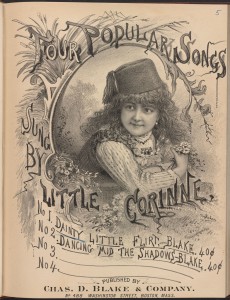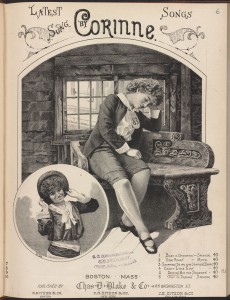Long before moving pictures “normalized” the idea of children entertainers like Jackie Coogan and Shirley Temple, there were half-pints on stage who drew audiences and criticism. One of the first was “Little Corinne,” a sassy singer and actor, who some feared was being corrupted by show business. She probably was. Of course, there were children all over the country who were impoverished and being completely ignored while the Corinne case was being argued vociferously. An excerpt from a story about Corinne in the November 30, 1881 New York Times:
“A handsome, dark-complexioned little girl, quick of movement and vivacious in manner, was taken before Judge Donohue, in Supreme Court, yesterday, by Mr. E. Fellows Jenkins, the Superintendent of the Society for the Preservation of Cruelty to Children. She was well dressed and in every respect looked like the child of loving and wealthy parents. Accompanying her and her custodian was a stout, good-looking woman, who wore a silk circular lined with fur. The child clung to this woman, and gave every evidence that she loved her. Mr. Eldridge T. Gerry, President of the Society for the Prevention of Cruelty to Children, informed the court that the child was the little actress and singer known as ‘Corinne.’ He said that his society had taken charge of her because, being only 9 years old, she was ‘unlawfully exhibited and employed’ in dancing, singing, and acting on the theatrical stage. The authority for her arrest was an order of the court, based upon a petition of the society averring that ‘Corinne’ was thus unlawfully employed by Jennie Kimball, or Flaherty, who was neither her lawful guardian nor a fit person to have control of her, or to be intrusted with her education. It was the intention of Jennie Kimball, it was averred, to exhibit ‘Corinne’ at the Metropolitan Casino in plays in which she will be compelled to sing and dance, and prior to which she will have to commit to memory large portions of plays. All these things are alleged to be detrimental to the proper physical and mental development of the child, who is of remarkable beauty and of a quick, nervous, and excitable temperament. It is also averred that Corinne’s parents are dead, and that she has no natural or legal guardian.
Mrs. Flaherty avowed that she had had the custody of the child ever since she was 2 years old, and that ‘Corinne’s’ mother appointed her as guardian. She asserted that it pleased the child to learn her lines and music, and that Corinne was in excellent health, that she walks every pleasant day, and has a maid, and a carriage and horses to ride whenever she chooses.
The inquiry into the circumstances of the child was then begun. Corinne was the first witness and she gave her testimony in a clear and interesting manner. She said she would be 10 years old next Christmas. She had known her mamma (Mrs. Flaherty) a very long time, but she could not tell how long. Her mamma taught her the part of Little Buttercup when she was about 5 years old, and she played in Boston a long time. She liked to sing and act, and she did not get tired, although she was often called out by the audience. Once a big ship, in which was $1,500, was presented to her. She was asked by Mr. Gerry what she did with the money, and she answered sharply:
‘I gave it to mamma to save; what else would I do with it?’
She said that she wanted to play in the Metropolitan Casino. ‘All the other little girls are allowed to play,’ she said petulantly, ‘and I am not. I don’t think that is right.’ As Corinne declared that she was tired, the examination was adjourned until noon to-day. The child was much distressed at being separated from Mrs. Flaherty and at the fear of being taken to prison. She was finally reassured, and went away to the house of Superintendent Jenkins, accompanied by her maid and her dog Fritz.”
More recent Old Print Articles:
- The emergence of brain surgery. (1895)
- Woman swallows a lizard, dies. (1900)
Tags: Little Corinne


